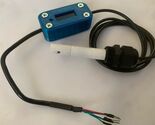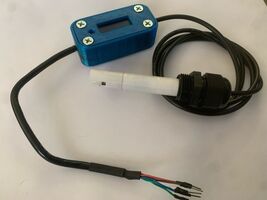Rendered at 07:43:50 11/22/25
Free Shipping
Arduino Conductivity sensor
Ships from
United States

Share & earn! Sign in, share this or any listing, and you’ll get commission when it sells.
Learn more
Shipping options
No shipping price specified to CA
Ships from
United States

Offer policy
OBO - Seller accepts offers on this item.
Details
Return policy
Full refund available within 30 days
Purchase protection
Payment options
PayPal accepted
PayPal Credit accepted
Venmo accepted
PayPal, MasterCard, Visa, Discover, and American Express accepted
Maestro accepted
Amazon Pay accepted
Nuvei accepted
Shipping options
No shipping price specified to CA
Ships from
United States

Offer policy
OBO - Seller accepts offers on this item.
Details
Return policy
Full refund available within 30 days
Purchase protection
Payment options
PayPal accepted
PayPal Credit accepted
Venmo accepted
PayPal, MasterCard, Visa, Discover, and American Express accepted
Maestro accepted
Amazon Pay accepted
Nuvei accepted
Item traits
| Category: | |
|---|---|
| Quantity Available: |
10 in stock |
| Condition: |
New |
| MPN: |
Does Not Apply |
| Country/Region of Manufacture: |
United States |
| Brand: |
MKRian |
| Type: |
00 |
| UPC: |
Does not apply |
Listing details
| Shipping discount: |
Seller pays shipping for this item. |
|---|---|
| Posted for sale: |
November 19 |
| Item number: |
1779868829 |
Item description
Easy-to-use Interface: The sensor features a user-friendly interface that simplifies data collection and analysis, making it accessible for students of varying technical abilities.
Measures Key Parameters: With MKRsensors, students can readily measure essential water quality indicator such as conductivity.
Durable and Reliable: Built for educational environments, the MKRsensors is designed for long-lasting use, ensuring dependable data collection for numerous experiments.
Hands-On Learning: Fosters active engagement in scientific investigation, allowing students to design experiments, collect real-world data, and analyze results effectively.
Supports Environmental Awareness: By directly analyzing water samples, students gain a deeper appreciation for the importance of water quality and the impact of human activities on aquatic environments.
Works with Arduino or other ADC.
Spec
Range: 0-3000uS +/- 2%
Power: 5v
Output: 0-4v
Calibration: Trim pot
Connections: 5 pins (two for OLED display and three for power and output.)
Electrode: Graphite tips. Plastic body. Submersible. K=1 with 4 ft of cable.
Temperature compensated: Yes, built in 10k NTC.
Here is an Arduino Uno sample sketch
Feel free to modify and play with it. Good luck!
#include Wire.h
#include Adafruit_GFX.h
#include Adafruit_SSD1306.h
// OLED display width and height,
change if necessary
#define SCREEN_WIDTH 128
#define SCREEN_HEIGHT 32
// Declaration for SSD1306 display
connected using I2C
#define OLED_RESET -1
Adafruit_SSD1306 display(SCREEN_WIDTH,
SCREEN_HEIGHT, Wire, OLED_RESET);
// Define pin connections
const int voltageSensorPin = A1; //
Analog pin to read voltage
float voltage = 0000;
void setup() {
// Initialize the OLED display
if
(!display.begin(SSD1306_SWITCHCAPVCC, 0x3C)) {
Serial.println(F("SSD1306
allocation failed"));
for (;;); // Don't proceed, loop
forever
}
display.clearDisplay();
display.display();
// Initialize pins
pinMode(voltageSensorPin, INPUT);
// Print initial message
display.setTextSize(2.9);
display.setTextColor(SSD1306_WHITE);
display.setCursor(0,13 );
display.println(" MKRsensor");
display.display();
delay(4000); // Display initial
message for 2 seconds
}
void loop() {
// Read the voltage from the sensor
int sensorValue =
analogRead(voltageSensorPin);
voltage = sensorValue * 5000.0 /
1024, 2 ; // Assuming a voltage divider with a 10:1 ratio
// Display the voltage and set point
on the OLED
display.clearDisplay();
display.setCursor( 0, 13);
display.print(" uS:");
display.print(voltage,1);
display.display();
delay(500); // Update delay
}
Added to your wish list!

- Arduino Conductivity sensor
- 10 in stock
- Price negotiable
- Returns/refunds accepted
Get an item reminder
We'll email you a link to your item now and follow up with a single reminder (if you'd like one). That's it! No spam, no hassle.
Already have an account?
Log in and add this item to your wish list.









